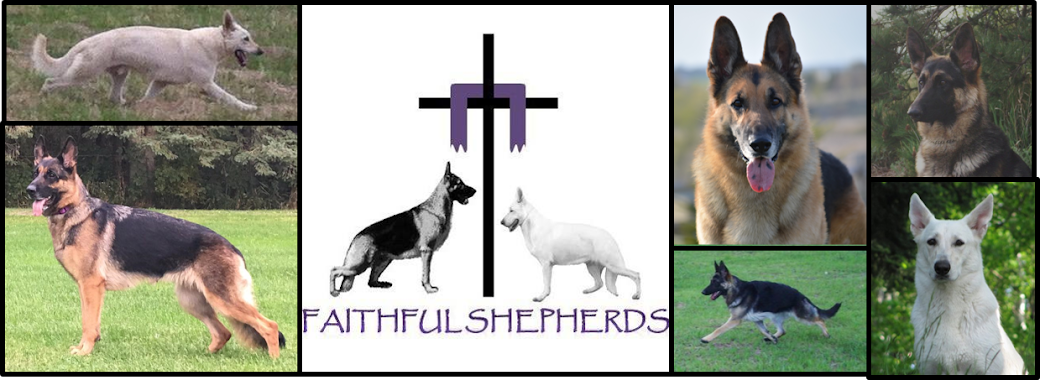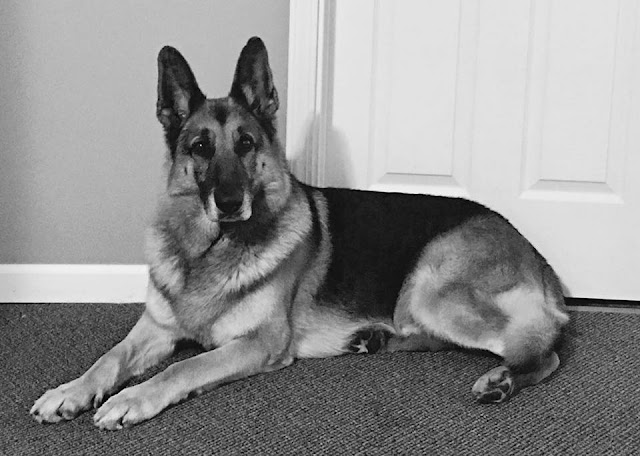About the German Shepherd Dog
The German Shepherd Dog is an all-purpose herding breed that originated in Germany by cavalry officer Captain Max von Stephanitz. The breed is well known for being courageous, intelligent, naturally protective, and an excellent working dog. The German Shepherd Dog is a versatile dog that thrives on human companionship, usually bonding only with one person or family. Owners of a GSD(German Shepherd Dog) can expect their dog to be adaptable and ready to do anything that is asked of them. It is typical of the breed to be eager to learn and to please their owner, but their owner needs to be willing to mentally and physically stimulate their dog to provide an outlet for this intelligent and energetic family member. The breed is prized by law enforcement and also as loving family pets. Well bred GSDs exude confidence and vitality. Ethical, responsible breeders make a huge effort in preserving the breed's protective nature, calm presence, working ability, strength of mind, and health of body.
About Raising a German Shepherd Dog

Raising a GSD to be a well mannered member of society and a capable performance or working dog can seem like a daunting task. It really shouldn't be difficult though if the puppy is well-bred. Some lines within the breed tend to be more reactive than others, but it is important to distinguish reactivity from aggression. The German Shepherd is a vigilant breed of dog that examines their surroundings and investigates without hesitation; notice I didn't say "without caution." It is only natural for a dog to be slightly cautious of new surroundings/people until no danger is identified, but a GSD also should never be fearful. Genetics play a key role in the temperament of a puppy and how the puppy reacts to different stimuli. The role the puppy owner needs to assume is that of a leader that governs what reactions are acceptable, not whether the puppy reacts or not. Socialization is of utmost importance here. Exposing a puppy to new stimuli once and expecting them to act militant for the rest of its life is an unrealistic expectation. German Shepherd puppies are very observant and need a calm, assertive owner to guide them in their explorations of their surroundings, and the more frequent this is done in a controlled, pleasant way, the greater the chances of achieving a predictable, confident adult dog. *German Shepherds tend to be more reactive to visual stimuli(eye contact) than some other breeds, so keep this in mind*
Training and Socialization
Training and socialization should start early and be maintained throughout life. The first two years are the most crucial, but even older dogs enjoy socialization and deserve the mental and physical exercise in training. Raising a puppy takes a village, and it should! It is important that a GSD puppy learns from an early age, that separation from their owner is okay and that they aren't in danger if being handled by a person other than their immediate family(friends, veterinary team, etc). German Shepherds are capable of life-long learning and it would be cruel to deprive them of a chance to learn and bond with their owner and limit the kind of partnership that the breed is known for! If you are considering a GSD puppy, we urge you to explore the activities you and your puppy could do together! The possibilities are endless! Consider activities with local breed clubs and forming friendships with others that love this breed too!
Nutrition
Nutrition is an important part of canine development. We feed all our dogs a variety of high quality kibble and will supplement their diet with small amounts of cooked eggs and raw chicken livers. (Raw feeding is not recommended, but we will cautiously feed raw meat to our breeding females on occasion). Fruits and vegetables are also excellent additives to their diet...they are omnivores after all (no raisins, grapes, or onions of course)! The kibbles we usually feed are a mixture of Purina Proplan 30/20, Sportmix Large breed, Fromm, and Authority puppy formulas. We find an excellent balance of protein, fat, and carbohydrates in these kibbles and we mix them all together for ease of feeding multiple dogs with different life stage and activity/lifestyle needs. Intense supplementation should not be needed in a well-bred GSD. Inflammatory Bowel Disease(IBD), Vitamin B12 deficiencies, and Exocrine Pancreatic Insufficiency(EPI) are problems in the breed, so be sure to ask about these conditions before purchasing a puppy as they can be difficult and expensive issues to manage and are life-long ailments. We will never breed a GSD with any digestive disease.
An exercise routine is important for the life of any dog, but it is very important in intelligent breeds like the German Shepherd. If they don't receive adequate exercise, it can lead to behavior issues due to frustration which then can lead to neuroses. More exercise of course is not always better so it is also important to not over work them, especially when they are young or old. Exercise for a young puppy should mostly be play. Any long duration of sustained speed shouldn't be expected of a dog until the joints and muscles are well developed (at least a year of age). Strenuous exercise with or without any repeated movement shouldn't be expected of a dog until two years of age.
Preventative Care
Preventative Care is very important for the life of any dog, but we urge our puppy buyers to maintain good relations with their family veterinarian, not only for the health of their puppy but also for the routine exposure to the veterinary clinic (remember my remarks on socialization?). We HIGHLY recommend heartworm and flea/tick preventatives and routine vaccination. We vaccinate our dogs against Rabies, Distemper, Lyme disease, Leptospirosis, and Bordetella. Vaccination ins't always for everyone, but the important thing is that the decision to vaccinate or not vaccinate is a well-informed one. Please speak to a veterinary professional for more information about risk of exposure and vaccine schedule.
Emergency Care
Emergency Care is something every pet owner would rather not talk about, but it is inevitable that over the course of a dog's life, there will be accidents and illness. We will try our very best to breed the healthiest dogs we can, but we cannot control everything. German Shepherds are prone to several life-threatening conditions that require medical intervention for survival. Gastric dilatation-volvulus (GDV), mesenteric torsion, splenic torsion, and spontaneous hemoabdomen (commonly splenic hemangiosarcoma) are a few examples of acute-onset disease that plague the breed. It is our recommendation to always be financially prepared for an emergency by having $3k-$5k set aside or available in case of an unexpected trip to the vet.
If you're interested in a puppy from us...
If you're interested in a puppy from us, please read our Purchase Contract and go over it with your family. Contact us if you need things explained further or if you have any questions.
Once you have read the contract, please complete our application. From there, we will contact you once we've received your application. Please allow 1-2 days for our reply. Please contact us (612-280-8326) if for some reason we haven't responded to your application after 2 days.
We will ask you questions and we hope you'll have questions for us as well. If we feel you would be a good fit for one of our puppies, we will add you to our wait list and will contact you if we have an available puppy that would suit your needs.
Thank you for your interest in a Faithful Shepherd!










No comments:
Post a Comment